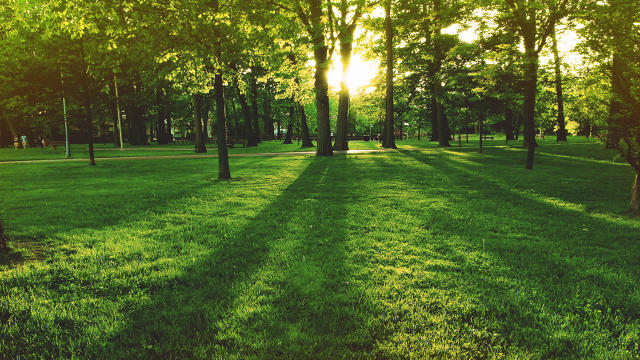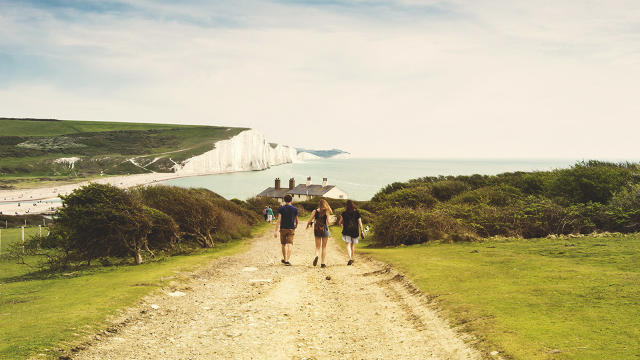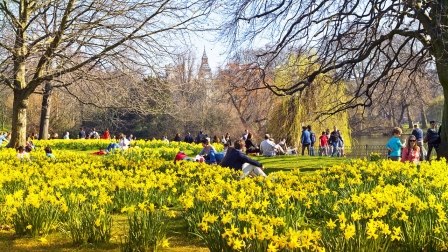This Is What Happened To My Brain When I Spent More Time In Nature
It’s a refrain that kids have heard from their parents for generations: “Go outside and play. It’ll be good for you.” Little did we know as children how valuable that advice was. Science has shown that parental wisdom to be more accurate than we realized. Study after study after study has now shown that there are multiple health benefits to spending time in nature.
Sara L. Warber, MD, professor of family medicine at the University of Michigan and an honorary associate professor at the European Centre for Environment and Human Health, University of Exeter in the U.K., has been studying the benefits of spending time in nature for years. Through her and other scientists’ research, they’ve found four main areas humans benefit from as a result of spending time in nature.
Physical benefits. “People tend to be more active when in nature. Also, people enjoy being physically active in nature more than indoors,” she says. Because of this, people are more likely to repeat the activity, which evidence has shown leads to lowered blood pressure, improved immune system function, and better endocrine system balance.
Mental benefits. “People who participate in group walks in nature have greater mental well-being, less depression, less stress,” says Warber. “There is also a large body of literature that shows better cognitive performance following a nature experience, and quicker recovery from stressful exposures.”
Emotional benefits. “Youth in camp settings, people in parks and people on group walks in nature experience more positive emotions and fewer negative emotions,” says Warber.
Spiritual benefits. Both youth and adults experience more transcendence, serenity, and tranquility when they spend time in nature.
Those physical, mental, emotional, and spiritual benefits seem almost too good to be true. I asked Warber if science has found a mechanism or process inside our bodies that is triggered by being in nature.
“This is an area of very active research now,” she says. “One likely mechanism is the Relaxation Response, mediated by the parasympathetic nervous system, which is the opposite of the ‘Fight or Flight’ Response, mediated by the sympathetic nervous system. The relaxation response has been investigated in relationship to meditation, mindfulness, and other stress reduction techniques being embraced in health care today.”
“In our study of park users in the U.K., the most commonly reported feeling after being in a park was ‘relaxed’. Some of the nature-based studies have used cortisol as a marker for lower stress and have had good results, implying that the endocrine system is affected as well. Other work in Japan has shown that our immune system is enhanced in nature.”
I’ve spent the last 20 years of my life living in major cities, which means I’ve spent a lot of time indoors. Reading many of the studies Warber referenced, I began to wonder just what would happen if I started to spend more time outdoors. So that’s exactly what I spent the last 30 days trying to find out.
My unscientific investigation was simple: Before undertaking my little experiment, my days were normally spent working from home or in the city. I generally did a lot of walking, but that was always on the concrete and brick streets of London. So for this experiment, I would spend no less than one hour in nature every day, Monday through Friday. I’m fortunate to live in a city where some of the parks, like Hyde Park and Regent’s Park, are so big that you could mistake them for being in the countryside. Then each weekend, I would spend one day journeying to the English countryside or seaside for a leisure hike. Here’s what I discovered:
My Stress Melted Away Almost Immediately
The most unexpected thing about my experiment was how quickly I realize results. On just my first few walks through London’s Regent’s and Hyde parks, I immediately felt less stressed and less rushed. It’s as if the parks acted like a cocoon, not only sheltering me from city noises, but my busy thoughts as well. This is the parasympathetic nervous system Relaxation Response that Warber was explaining in action.
“Your experience also points out that we often don’t expect to feel that good in nature; maybe we never knew, or maybe we forget simple things that help us,” says Warber. “Nature can be like an instant path to relaxation, similar to meditation.”

My Mood Improved
This next benefit I didn’t experience right away. But by my second week I started to notice my overall everyday mood had improved—even at times I wasn’t in nature. It was as if the accumulation of my time spent outdoors led to benefits that stuck with me, even when I returned to my city life.
“This is a great expression of the positive emotions mentioned above and the effects of repeated nature experiences,” says Warber. In this way, spending time in nature has cumulative effects, almost like weight loss. If a 300-pound person loses one pound, he’s still overweight. But lose one pound a week, and the benefits start to really add up overall. In this case, my mood boosts while walking in the park cumulated in a sum greater than their parts. And that’s a great thing, according to Warber, who notes that there is also “some evidence that positive emotions, like happiness, are linked to better overall health.”
I Felt More Creative
By my third weekend trip to the English coast, I felt more creative. This might sound weird, but it was easier for me to generate story ideas and I felt more creative overall. This was especially true when I was actually walking or hiking. I had a clarity I normally didn’t possess while walking through the city.
Warber says this creative benefit of being in nature is studied less thoroughly, but she has heard about many examples of children’s increased creativity in problem solving and social relationships when their schoolwork is conducted outside in nature. “The clarity you experienced may be explained by a fundamental theory in environmental psychology that suggests that nature provides an intrinsically fascinating surrounding that allows our effortful thinking to rest and be recharged,” she says.
My Memory Improved
This is perhaps the most unexpected benefit of spending more time in nature that I noticed—and one that surprised even Warber. I’m a guy who writes a to-do list out on sticky notes so I remember everything I need to accomplish for the day. But I found by my fourth week, I no longer needed to write out these notes. It’s as if my memory had improved, allowing me to keep a mental list in my head that I could easily access at any time.
“This is an exciting observation,” says Warber. “I am not aware of research that has specifically looked at memory in relation to longer-term repeated contact with nature.” (I haven’t found any research to this effect, either.) “This may be a result of your greater clarity of mind, or your overall improved mood, or your increased ability to be in the present moment with confidence in your mental processes.”
How You Can Benefit From Nature
Even though my experiment has ended, I’ve not stopped doing my daily hourlong walks in London’s parks. To me, they now seem as necessary as eating right, and I expect them to remain a part of my routine for the indefinite future. But what if you’re not lucky enough to live within easy distance to a large city park or countryside? Or what if you realistically don’t have an extra hour each day to spend walking through nature? Not to worry.

“People can benefit even from very short experiences in nature, such as 10 to 15 minutes per day. In fact, some research suggests that it is repeated short experiences that are most helpful,” says Warber, who notes forests or large parks aren’t necessary for most benefits. “Walks in tree-lined neighborhoods can increase longevity; walks in city parks can shift mental attitudes very quickly, providing a full range of physical, mental, emotional, and spiritual benefits.” Warber does suggest that those looking for spiritual benefits, like transcendent experiences, may need to stick to longer outings in denser or wilder nature.
The final query I put to Warber is who could benefit the most from spending more time in nature. Her first answer is expected: everyone. But she says that this might actually be an area where the elderly might have a leg up on their competition. “The older population, in general, has some memory of growing up in closer proximity to nature—this might lead them to seek that out more readily,” notes Warber. And while city dwellers are an obvious at-risk group, Warber says the most concern at present is for the young, who can be immersed in the screen-based culture and the demands of schooling or other organized activities. “They also don’t know what they might be missing in nature,” she says.
That’s why it’s up to researchers like Warber to prove the benefits, and you reading this, like my mom did for me when I was growing up, to tell the young to get outside and explore. Tell them to get their hands dirty—interact with the natural world around them.
And as for you? Go take a hike. Literally.
Related Video: Is Being Too Connected Ruining Your Productivity?
Fast Company , Read Full Story
(53)


